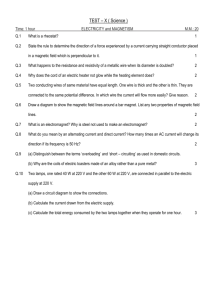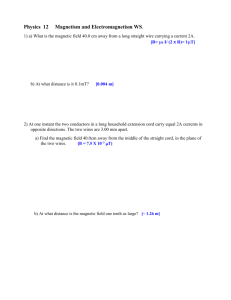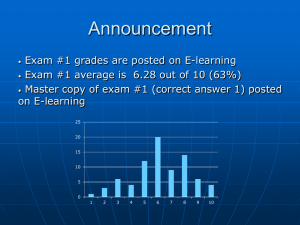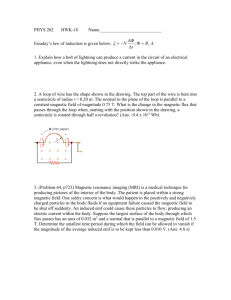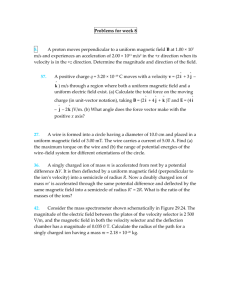Physics 2B Quiz 4
advertisement
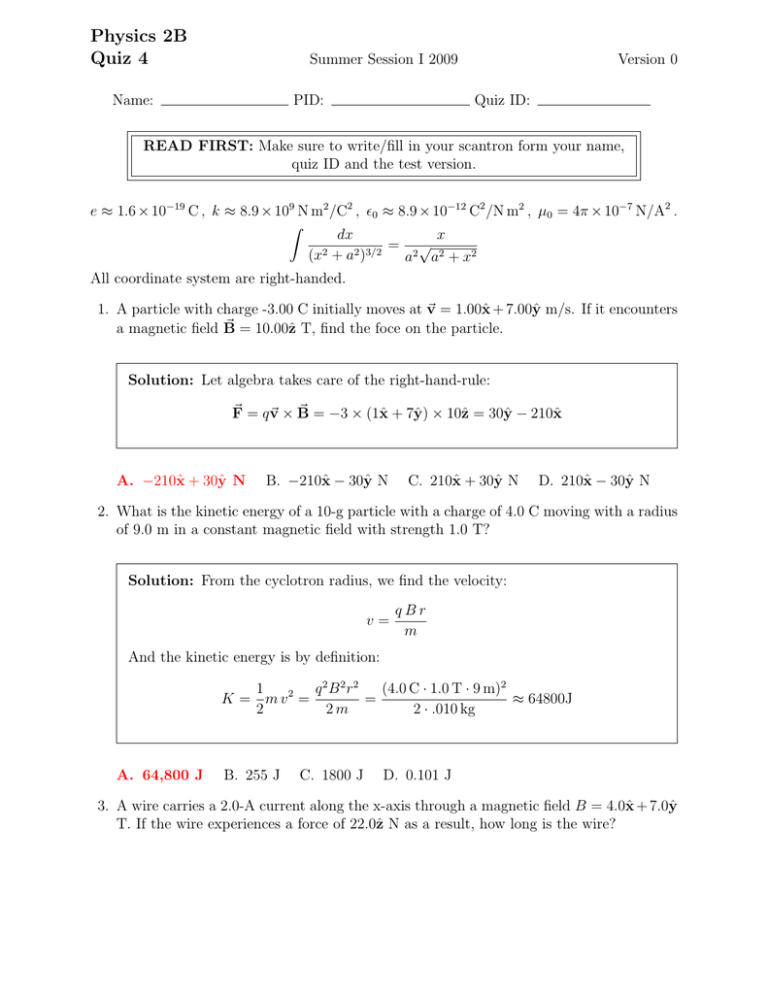
Physics 2B Quiz 4 Summer Session I 2009 Name: PID: Version 0 Quiz ID: READ FIRST: Make sure to write/fill in your scantron form your name, quiz ID and the test version. e ≈ 1.6 × 10−19 C , k ≈ 8.9 × 109 N m2 /C2 , 0 ≈ 8.9 × 10−12 C2 /N m2 , µ0 = 4π × 10−7 N/A2 . Z dx x = √ 2 2 3/2 (x + a ) a2 a2 + x 2 All coordinate system are right-handed. 1. A particle with charge -3.00 C initially moves at ~v = 1.00x̂ + 7.00ŷ m/s. If it encounters ~ = 10.00ẑ T, find the foce on the particle. a magnetic field B Solution: Let algebra takes care of the right-hand-rule: ~ = q~v × B ~ = −3 × (1x̂ + 7ŷ) × 10ẑ = 30ŷ − 210x̂ F A. −210x̂ + 30ŷ N B. −210x̂ − 30ŷ N C. 210x̂ + 30ŷ N D. 210x̂ − 30ŷ N 2. What is the kinetic energy of a 10-g particle with a charge of 4.0 C moving with a radius of 9.0 m in a constant magnetic field with strength 1.0 T? Solution: From the cyclotron radius, we find the velocity: v= qBr m And the kinetic energy is by definition: 1 q 2 B 2 r2 (4.0 C · 1.0 T · 9 m)2 K = m v2 = = ≈ 64800J 2 2m 2 · .010 kg A. 64,800 J B. 255 J C. 1800 J D. 0.101 J 3. A wire carries a 2.0-A current along the x-axis through a magnetic field B = 4.0x̂ + 7.0ŷ T. If the wire experiences a force of 22.0ẑ N as a result, how long is the wire? Physics 2B Quiz 4 Summer Session I 2009 Version 0 Solution: Compare both side of the equation: ~ = I ~l × B ~ F 22.0ẑ N = 2 A · l · x̂ × (4x̂ + 7ŷ) T 22.0 N ≈ 1.57 m l= 2A × 7T A. 1.57 m B. 1.36 m C. 2.8 m D. 1.00 m 4. A single loop equilateral triangle conductor with 3-cm sides has a 2-A current in the direction as indicated by the arrow. What is its magnetic dipole moment? y I x 3 cm Solution: By the right hand rule, the direction of√the magnetic dipole moment is in the −ẑ direction. The height of the triangle is 3 3/2 cm. The magnitude is: √ ! (3 cm)2 3 ≈ 7.79 A · cm2 µ = N I A = 2A · 4 A. -7.8 ẑ A · cm2 B. 7.8 ẑ A · cm2 C. 18 ẑ A · cm2 D. -18 ẑ A · cm2 5. A segment of a wire lies on the x-axis between x = −1 and x = 1. A current I is running from x = 1 to x = −1. Which of the following is the correct expression of the magnetic field due to this segment at distance y away from the wire on the y-axis? Solution: Cut the segment into infinitesimal pieces as usual. Taken into account the direction of the current, the segment at x is Id~l = −Idx~x. By the right hand Page 2 Physics 2B Quiz 4 Summer Session I 2009 Version 0 rule, the direction the magnetic field due to each segment is in the −ẑ direction. The magnitude is given by: Z1 Z1 µ I y dx sin θ dx µ I 0 0 ~ = B (−ẑ) = − ẑ 2 2 2 4π x + y 4π (x + y 2 )3/2 −1 −1 1 µ0 I µ0 I x ẑ ẑ p p =− =− 2 2 4π y x + y 2π y 1 + y 2 −1 y (0, y) −1 1 x Note: Use the right hand rule and the given direction of the current, one find that the magnetic field is into the page (the −ẑ direction) when y > 0 and out of the page (the ẑ direction) when y < 0. The only choice that have this property is µ0 I ẑ p − . 2π y 1 + y 2 A. − µ0 I ẑ p 2π y 1 + y 2 B. µ0 I ẑ p 2π y 1 + y 2 C. − µ0 I ẑ p 4π 1 + y 2 D. µ0 I ẑ p 4π 1 + y 2 6. A wire is formed into a circle with radius 10.00 mm. A current flow through the wire and causes a magnetic field B at the center of the loop. If the wire is heated and the radius expands by 9.00%, what does the magnetic field become at the center of the loop. Solution: The magnetic field in the center of a circular loop, as shown in class and textbook example is inversely proportional to the radius of the circle. Expanding the radius by 9% means the new area is 1.09 times of old area. The new magnetic field is thus B/1.09. A. B/1.09 B. 1.09B C. B/(2π1.09) D. B Page 3 Physics 2B Quiz 4 Summer Session I 2009 Version 0 7. As shown in the following figure, a 1-m long metal rod of mass 10 g is free to slide up and down two guide wires. The whole setup is in a perpendicular magnetic field and gravity is acting down in the −~y direction. If the rod is suspended and not moving, what is the magnetic field? g y 1111111 0000000 x 20Ω z 10V + Solution: The current through the rod is 0.5 A in the x̂ direction. The magnetic force to be upward (ŷ) in order to cancel gravity. So, the magnetic field is in the (−ẑ) direction. To find the magnitude, set the magnetic force and gravitational force equal: mg 0.01 kg · 9.8 m/s2 mg = lIB B= = = 0.196 T lI 1 m · 0.5 A A. -0.196ẑ T B. 0.196ẑ T C. 2ẑ T D. -2ẑ T 8. A solenoid 3.0-cm long consists of 6075 loops of wire. If the magnetic field inside the solenoid is 2.0 T, what is the magnitude of the current that flow through it? Solution: In the equation B = µ0 nI, n is number of loop per length: n = 6075/.03 m−1 ≈ 202500 m−1 . I= A. 8 A B. 0.13 A 2.0T B ≈ 7.86 A = −7 µ0 n 4π × 10 N/A2 × 202500 m−1 C. 100 A D. 3.0 A 9. Four long, parallel wires are located at the corners of a square 15 cm on a side. Each carries a current of 2500 A with the top two into the page and the bottom two out of the page. Find the magnetic field at the center of the square. Page 4 Physics 2B Quiz 4 Summer Session I 2009 Version 0 Solution: Use the principle of super √ position. The distances between each wire to the center are the same: r = 0.15/ 2 m. The total contribution to the y-component by the four wires cancel. The x-components add: µ0 I π 4 4 π · 10−7 N/A2 · 2.5 A B =4× cos = √ × ≈ 13.3 × 10−6 T √ 2πr 4 2 2 π · 0.15/ 2 m A. 13.3 mT B. 3.3 mT C. 18.8 mT D. 4.7 mT ~ = −y 2 x̂ + x2 ŷ. How much 10. The magnetic field in the x-y plane of some system is B current flows through the square with two diagonal corners at (0, 0) and (1, 1). Solution: Use Ampère’s law and perform line integral along each of the four segments of the square: I Z Z Z Z ~ ~ ~ · d~l µ0 Iinside = B · dl = + + + B bott Z1 = (x2 ŷ) · x̂ dx + 0 righ Z1 top left (−y 2 x̂ + 1ŷ) · ŷ dy 0 Z0 + (−1x̂ + x2 ŷ) · x̂ dx + 1 Z0 (−y 2 x̂) · ŷ dy 1 =2 Alternative: An alternaltive way to state Amère’s law is that the curl of the magnetic field is the current density: 1 ∂B ∂B 1 1 y x ~ = ~J = ∇ ~ ×B − ẑ = (2x + 2y)ẑ µ0 µ0 ∂x ∂y µ0 The current is simpliy the area integral over the desired area: Iinside 1 = µ0 Z ~J · dA ~ = 1 µ0 Z1 Z1 2(x + y)dxdy = 0 A. 2/µ0 B. 0 C. 4/µ0 D. 1/µ0 Page 5 0 2 µ0
